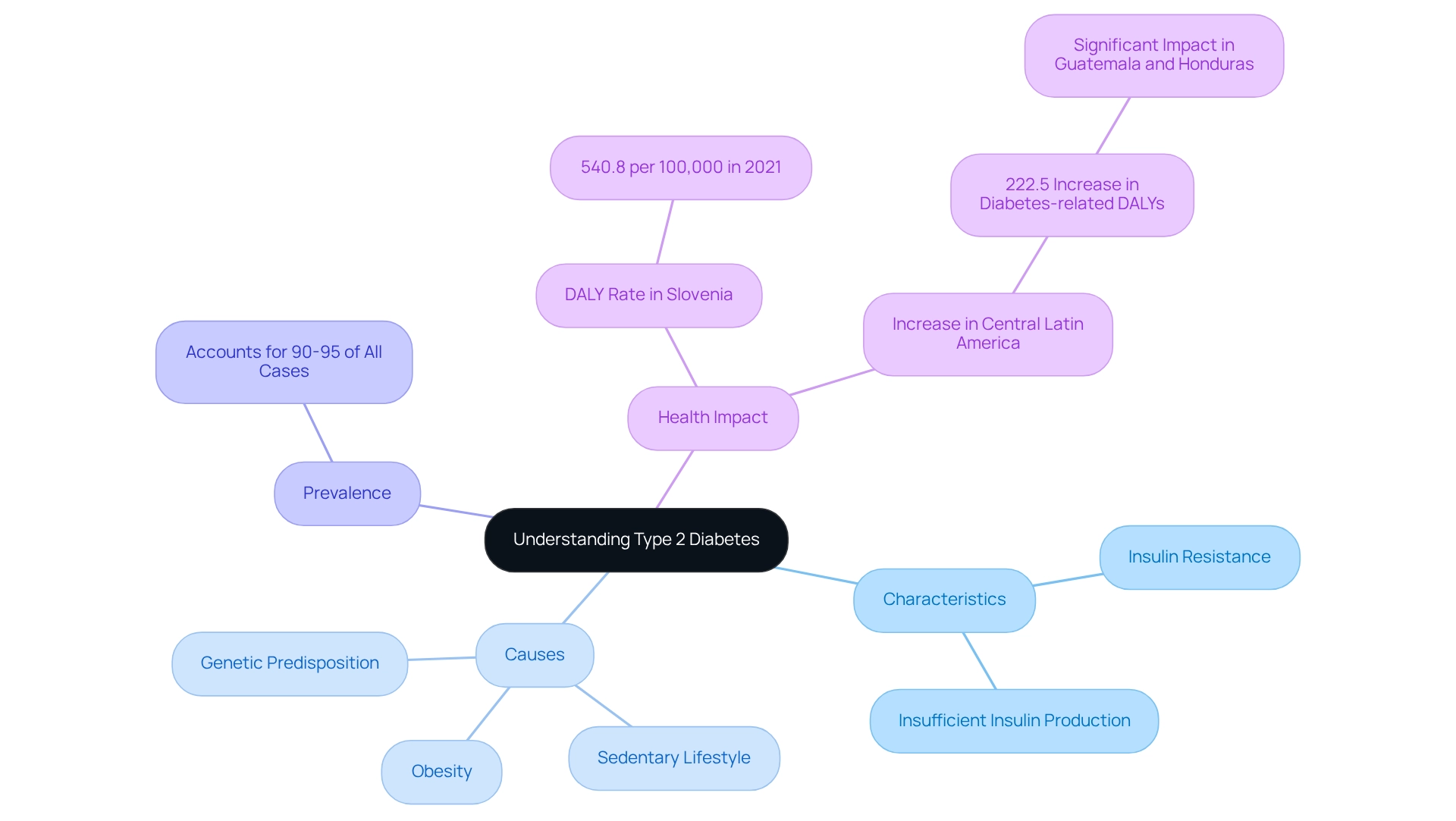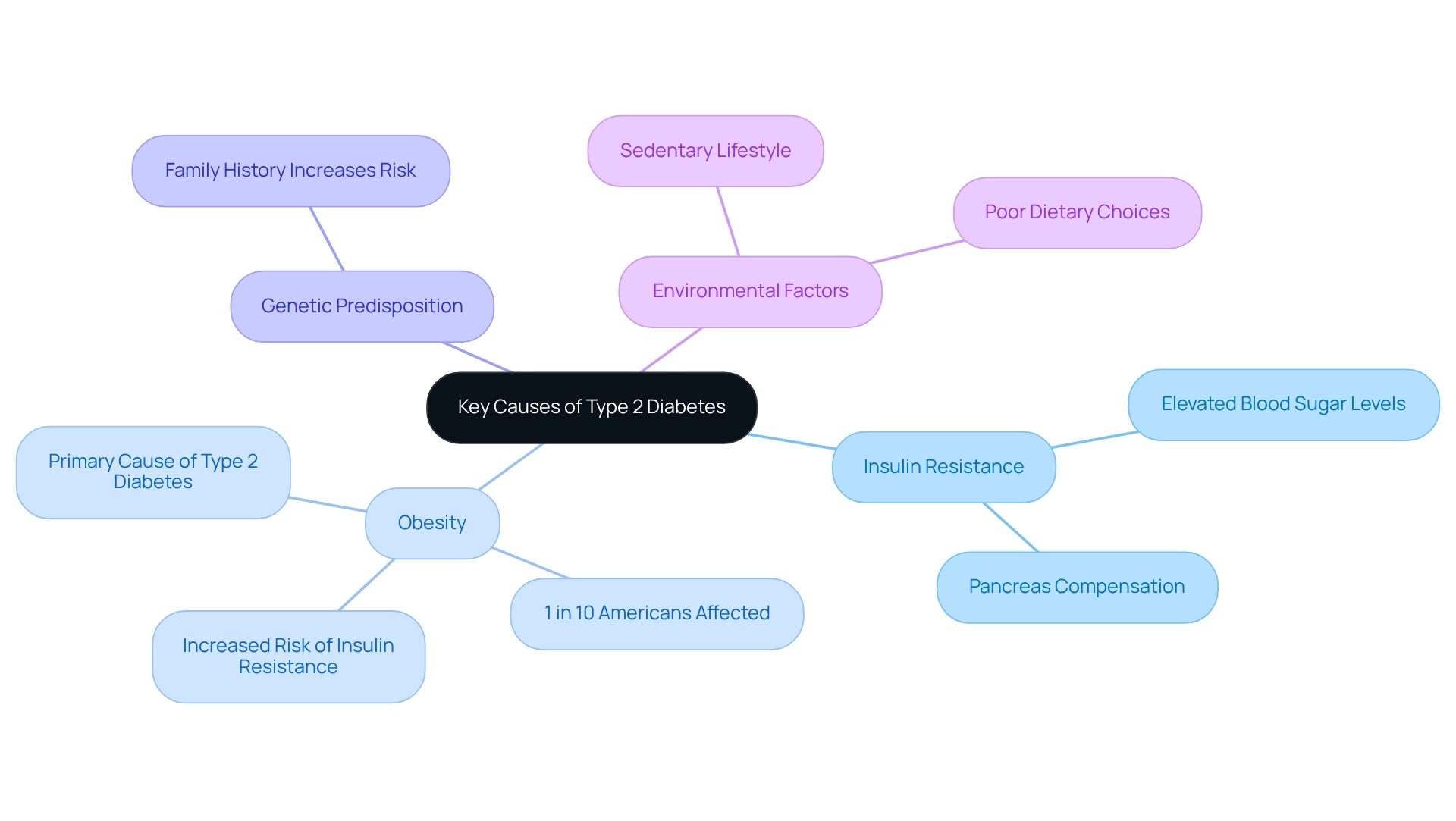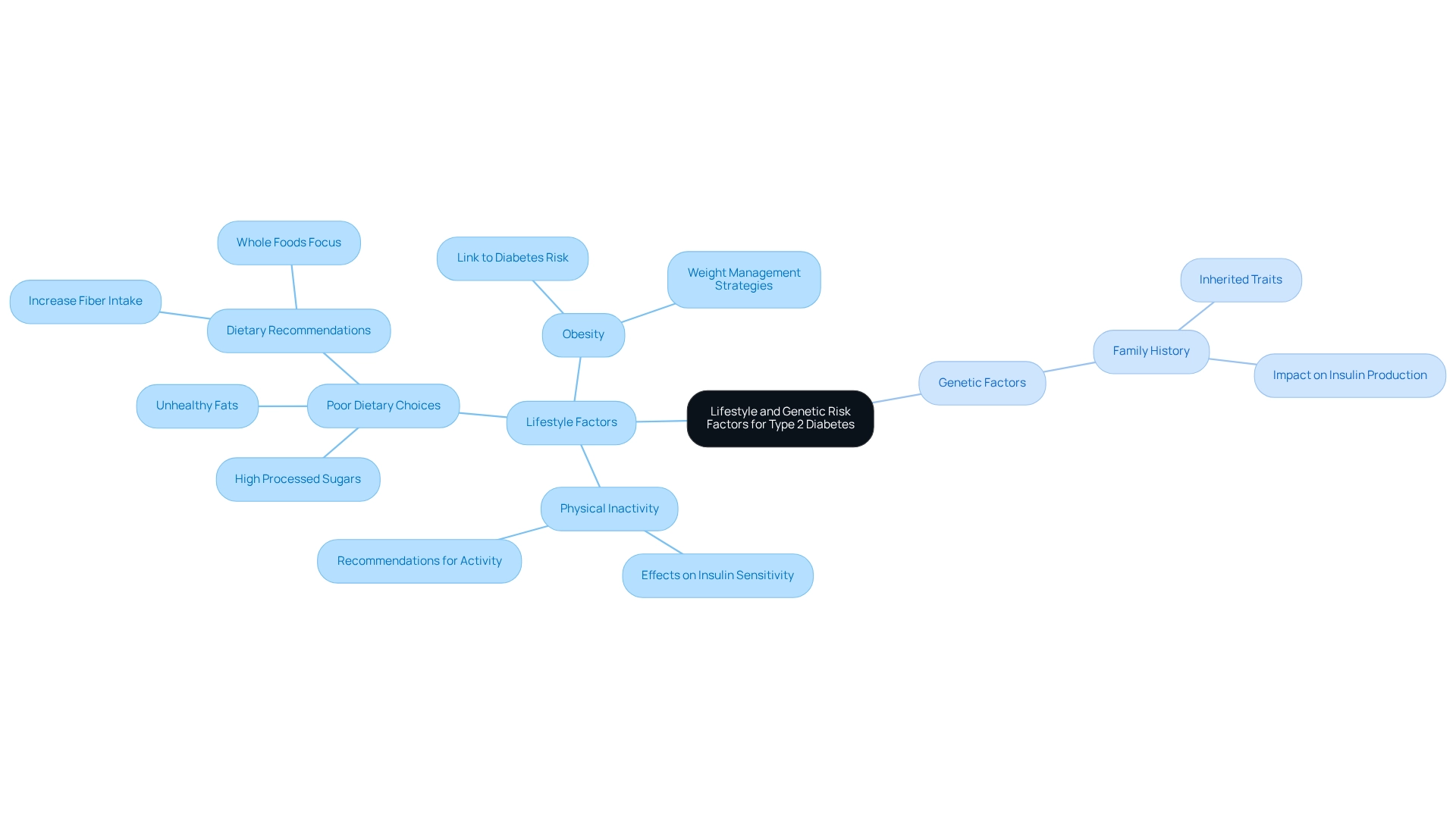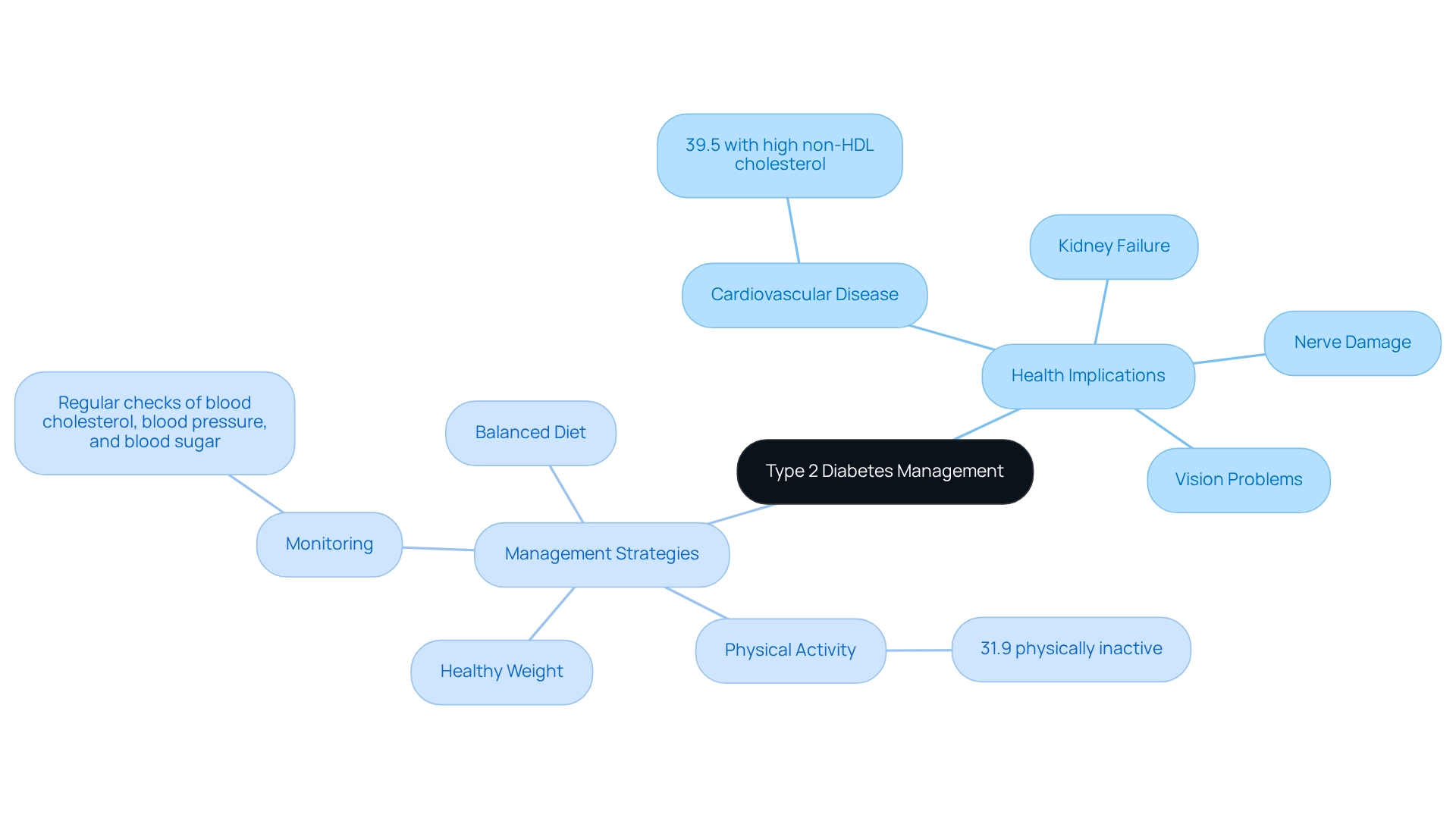Overview
Type 2 diabetes often stems from insulin resistance, a condition that is largely influenced by obesity, a sedentary lifestyle, and genetic factors. It's important to recognize how these elements can elevate blood sugar levels. You're not alone in this journey; many individuals face similar challenges.
To effectively manage and prevent type 2 diabetes, lifestyle changes are crucial. This can feel overwhelming, but community support is available and can make a significant difference. We are here to support you every step of the way.
Consider reaching out for resources that can guide you in making these changes. Remember, taking action today can lead to a healthier tomorrow.
Introduction
In a world where chronic illnesses are increasingly prevalent, Type 2 Diabetes has emerged as a significant public health challenge, affecting millions globally. This condition, characterized by insulin resistance and elevated blood sugar levels, impacts not only physical health but also poses serious mental health risks, including a heightened likelihood of depression.
It's understandable to feel overwhelmed by these statistics. As the prevalence of Type 2 Diabetes continues to grow, understanding its causes, risk factors, and management strategies becomes increasingly vital.
This article delves into the complexities of Type 2 Diabetes, exploring its definition and key contributors such as obesity and genetics, while also highlighting the implications of unmanaged diabetes.
With resources like T2DSolutions stepping in to provide education and support, individuals are empowered to take proactive steps toward effective management and improved health outcomes.
Remember, you're not alone in this journey; we are here to support you every step of the way.
Define Type 2 Diabetes
Form 2 of the condition is a persistent metabolic disorder that can be challenging, characterized by increased blood sugar levels due to insulin resistance and insufficient insulin production. Unlike the first form of the condition, where the body cannot generate insulin, individuals with the second form can produce insulin. However, their cells do not react effectively to it, which can be frustrating. This condition typically develops gradually and is closely linked to factors such as obesity, a sedentary lifestyle, and genetic predisposition—recognized as the main causes of type 2 diabetes. It's important to note that type 2 diabetes is prevalent, accounting for approximately 90-95% of all cases worldwide.
Recent statistics indicate that the age-standardized disability-adjusted life years (DALY) rate for this illness in Slovenia was 540.8 per 100,000 in 2021. This underscores the significant health burden associated with this condition. Furthermore, a study on blood sugar management in Central Latin America revealed a staggering 222.5% increase in conditions related to DALYs, particularly affecting countries like Guatemala and Honduras. This highlights the urgent need for comprehensive care and prevention programs.
Understanding this definition is crucial, as it underscores the complexity of the disease and the necessity for effective management strategies tailored to individual needs. Remember, you're not alone in this journey. As T2DSolutions introduces itself as a new resource center for information and assistance regarding the condition, it seeks to offer valuable insights and community resources to aid individuals in managing their condition effectively. We are here to support you every step of the way.

Identify Key Causes of Type 2 Diabetes
Insulin resistance is recognized as a significant contributor to type 2 diabetes, where the body's cells struggle to respond effectively to insulin. This condition leads to elevated blood sugar levels, as glucose has difficulty entering cells for energy. Over time, the pancreas tries to compensate by producing more insulin, but eventually, it may not be able to keep up with the body's growing demands.
It's important to understand that obesity, particularly excess abdominal fat, significantly heightens insulin resistance. In fact, it is often considered the primary cause of type 2 diabetes. Statistics reveal that 1 in 10 Americans is affected by a metabolic disorder, underscoring the urgent need to address obesity as a key factor. Moreover, recent research indicates that individuals with obesity are at a much higher risk of developing insulin resistance, which highlights the importance of taking preventive actions.
Genetic predisposition also plays a crucial role; if you have a family history of this condition, your risk may increase significantly. Environmental factors, such as a sedentary lifestyle and poor dietary choices, can further elevate the likelihood of developing insulin resistance.
Notably, during the years 2017-2018, 5,293 children were diagnosed with type 2 diabetes. This statistic emphasizes the pressing need for education and preventive strategies aimed at younger populations. As the CDC states, "Across all ethnic groups, type 2 conditions are increasing around the age of puberty," which further highlights the critical importance of early intervention.
Additionally, the financial burden of this condition is considerable. Between 2012 and 2022, the additional medical expenses per individual linked to this illness rose from $10,179 to $12,022. It's understandable to feel concerned about these implications.
Experts agree that addressing insulin resistance through lifestyle changes can be crucial in managing and preventing this condition. T2DSolutions emphasizes the importance of community support in improving health outcomes, reinforcing the idea that we can achieve better management of this condition together. Remember, you're not alone in this journey; we are here to support you every step of the way.

Examine Lifestyle and Genetic Risk Factors
Lifestyle factors are often seen as the primary contributors to type 2 diabetes, with several modifiable elements significantly influencing the likelihood of developing this condition. Key factors include:
- Physical inactivity
- Poor dietary choices
- Obesity
Engaging in regular physical activity not only helps maintain a healthy weight but also enhances insulin sensitivity, which is vital for glucose regulation. It's understandable to feel overwhelmed by dietary choices, but a diet rich in whole foods—like fruits, vegetables, whole grains, and lean proteins—can aid in preventing excessive weight gain and lowering the chances of developing health issues related to blood sugar. In contrast, diets high in processed sugars and unhealthy fats have been linked to an increased risk of type 2 diabetes, highlighting the importance of mindful eating.
Genetic predisposition is another essential factor; individuals with a family history of this illness may feel concerned as they are at an elevated likelihood due to inherited traits that influence insulin production and glucose metabolism. For example, studies show that the yearly rise in the prevalence of this condition from 2002 to 2012 was around 4.8%, underscoring the escalating worry regarding this issue.
Nutritionists emphasize the importance of dietary changes in preventing this illness. They recommend evaluating dietary habits and implementing gradual modifications, like boosting fiber consumption, to reduce potential issues. Furthermore, research indicates that lifestyle modifications, such as better nutrition and enhanced physical exercise, can greatly lower the likelihood of developing this condition, especially among high-risk groups, including non-Hispanic blacks and American Indians. Identifying these demographic differences is essential for customizing education and intervention programs for managing blood sugar levels.
Moreover, it’s vital to recognize that individuals with this condition are twice as likely to experience depression compared to those without it. This highlights the necessity for community support and mental health resources in managing diabetes. You're not alone in this journey; understanding these lifestyle and genetic contributing factors is crucial for making informed decisions to address the main cause of type 2 diabetes and reduce the chances of developing the condition. By fostering a supportive community and sharing knowledge, T2DSolutions empowers individuals to take proactive steps towards better health. Together, we can navigate this path toward wellness.

Discuss Implications and Management of Type 2 Diabetes
The implications of unmanaged Type 2 Diabetes extend far beyond elevated blood sugar levels, and it's crucial to recognize their profound impact. If not properly managed, individuals may face a heightened risk of serious health complications, including:
- Cardiovascular disease
- Nerve damage
- Kidney failure
- Vision problems
Alarmingly, statistics reveal that 39.5% of adults with blood sugar conditions have non-HDL cholesterol levels of 130 mg/dL or higher, indicating a significant risk for cardiovascular issues. It's also important to note that individuals with this condition are twice as likely to experience depression compared to those without it, highlighting the mental health challenges that accompany managing this illness. With 252 million individuals living with undiagnosed blood sugar issues, the need for effective management strategies for newly diagnosed patients is more critical than ever. Projections suggest that the total number of individuals living with this condition could rise to 853 million by 2045, underscoring the urgency of addressing this growing health crisis.
Effective management of Type 2 Diabetes requires a multifaceted approach to address its root causes. Key strategies include:
- Adopting a balanced diet
- Engaging in regular physical activity
- Maintaining a healthy weight
A recent case study found that 31.9% of adults with the condition were physically inactive, defined as participating in less than 10 minutes of moderate or intense activity per week. This emphasizes the pressing need for programs that encourage regular physical activity as an essential component of health management.
Monitoring blood sugar levels and adhering to prescribed medications are also critical for effective management. Routine assessments of blood cholesterol levels, blood pressure, and blood sugar are vital for lowering the risk of complications. Education and support from healthcare professionals, such as Certified Educators, empower individuals to take charge of their health and make informed choices regarding their condition management. As Katherine Marengo, LDN, R.D., observes, "This visual guide can help take the guesswork out of snacks when managing type 2 conditions," reinforcing the importance of practical resources in care.
By understanding the implications of unmanaged Type 2 Diabetes and implementing current management strategies, individuals can significantly enhance their quality of life and reduce the risk of complications. T2DSolutions serves as a valuable resource hub for diabetes education and community support, offering tools and information to assist newly diagnosed patients. The latest management strategies for 2025 emphasize a holistic approach, integrating lifestyle changes with medical guidance to foster better health outcomes.

Conclusion
The complexities surrounding Type 2 Diabetes reveal an urgent need for awareness and proactive management. This chronic metabolic disorder, primarily caused by insulin resistance and influenced by factors like obesity and genetics, underscores the importance of understanding both its causes and implications. With statistics illustrating the rising prevalence of this condition, particularly among vulnerable populations, it’s clear that effective interventions are critical.
Lifestyle choices play a pivotal role in the risk of developing Type 2 Diabetes. Engaging in regular physical activity and maintaining a balanced diet can significantly reduce the likelihood of onset and improve management for those already diagnosed. It’s also important to recognize the mental health challenges associated with diabetes, highlighting the necessity of a supportive community and accessible resources, such as those provided by T2DSolutions.
Ultimately, the journey towards managing Type 2 Diabetes is not one that needs to be faced alone. By fostering education, community support, and a comprehensive understanding of effective management strategies, individuals can take control of their health. You're not alone in this journey. As the landscape of diabetes continues to evolve, staying informed and proactive can lead to improved health outcomes and a better quality of life for those affected by this condition. We are here to support you every step of the way.
Frequently Asked Questions
What is Form 2 of the condition?
Form 2 of the condition, also known as type 2 diabetes, is a persistent metabolic disorder characterized by increased blood sugar levels due to insulin resistance and insufficient insulin production. Unlike type 1 diabetes, individuals with type 2 can produce insulin, but their cells do not respond effectively to it.
What are the main causes of type 2 diabetes?
The main causes of type 2 diabetes include obesity, a sedentary lifestyle, and genetic predisposition.
How prevalent is type 2 diabetes globally?
Type 2 diabetes is prevalent, accounting for approximately 90-95% of all diabetes cases worldwide.
What does the DALY statistic indicate about type 2 diabetes in Slovenia?
The age-standardized disability-adjusted life years (DALY) rate for type 2 diabetes in Slovenia was 540.8 per 100,000 in 2021, highlighting the significant health burden associated with this condition.
What recent findings have been reported regarding blood sugar management in Central Latin America?
A study revealed a staggering 222.5% increase in conditions related to DALYs in Central Latin America, particularly affecting countries like Guatemala and Honduras, emphasizing the urgent need for comprehensive care and prevention programs.
Why is understanding type 2 diabetes important?
Understanding type 2 diabetes is crucial as it underscores the complexity of the disease and the necessity for effective management strategies tailored to individual needs.
What resources does T2DSolutions offer for individuals with type 2 diabetes?
T2DSolutions serves as a resource center for information and assistance regarding type 2 diabetes, offering valuable insights and community resources to aid individuals in managing their condition effectively.



